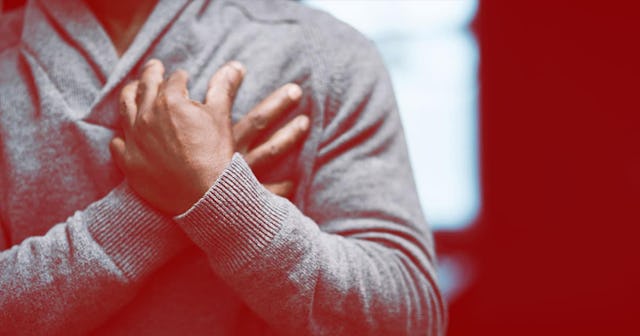COVID-19 And Heart Damage: Doctors And Researchers Are Concerned About Young People

I’ll be honest, it’s pretty difficult to keep grounded with COVID-19 in the air. It seems like every couple weeks doctors discover something new about the virus. There’s been the terrifying inflammatory syndrome (called multisystem inflammatory syndrome, or MISC-C) in children that was revealed some months ago. And then there’s the loss of smell and taste, in those that have tested positive.
And one of the side symptoms that isn’t often discussed is gastrointestinal symptoms. I’m a pretty healthy 37-year-old, non-smoking, vegetarian cyclist and back in March I developed one of the driest and most aggressive coughs of my life. It was bad enough that I couldn’t breathe several times in the night, something I’d never experienced before. But since I never got a fever, I was refused a test by my local hospital. However, I also had some pretty serious gastrointestinal issues that I will not detail here. Since I never got tested — and haven’t been tested for antibodies — I can’t say for sure, but I suspect I had COVID-19.
Now there is something new to add to the COVID-19 fallout, as if we needed something more to be concerned with. According to a new study, published in the JAMA Cardiology Journal, 78 percent of recovered COVID-19 patients had permanent heart damage. Naturally, if I did indeed have COVID-19, I’m recovered by now. But after reading this study, I’m left to ponder: If I did contract COVID-19, what else did it do to my body, particularly my heart?
The authors of this latest study are from the University Hospital Frankfurt. Doctors there examined MRIs of 100 people who had recovered from the coronavirus. The researchers found that nearly 80% of the patients exhibited heart changes.
So what does this mean? Well… according to the authors of the study, it means that while most of the discussion on COVID-19 has been about protecting the infected patients’ lungs, it seems clear that the heart is also heavily involved in fighting the virus.
Dr. Valentina Puntmann led the study. She was quoted in Newsweek saying that “The fact that 78 percent of ‘recovered’ [patients] had evidence of ongoing heart involvement means that the heart is involved in a majority of patients, even if COVID-19 illness does not scream out with the classical heart symptoms, such as anginal chest pain. In my view, the relatively clear onset of COVID-19 illness provides an opportunity to take proactive action and to look for heart involvement early.”
Tridsanu Thophet/EyeEm/Getty
Naturally, like most things COVID-19 in 2020, this is a preliminary study. But what I think is the most alarming to me, and it probably should be alarming to you as well, is that those 100 patients had a range of COVID-19 symptoms. The majority of the patients were not hospitalized and recovered at home. Some didn’t have any symptoms at all. And the long-term effects of the virus remain unknown. So ultimately what this study suggests is that there are detrimental effects to the cardiovascular systems, even after recovery — meaning that even though you might test negative for COVID-19 two weeks after testing positive, your body may sustain lingering damage.
This study isn’t the only discussion going on around heart damage after contracting COVID-19. According to a recent article in ESPN, a rare heart condition linked with the coronavirus is top on the list of concerns among Power 5 conference administrators when discussing the possibility of canceling or postponing fall division one sports. Myocarditis is an inflammation of the heart muscle. It has been found in at least five Big Ten Conference athletes, along with several other athletes in other conferences. Usually caused by a viral infection, myocarditis can result after contracting the common cold, H1N1 influenza, or mononucleosis. But what university athletic doctors are finding is that the COVID-19 virus has also been linked with myocarditis at a higher frequency than other viruses. If left undiagnosed, myocarditis can cause sudden cardiac arrest.
My day job is at a division one athletics program, and I can say with 100% certainty that anything causing heart concerns is a full stop — so it shouldn’t be surprising that universities are taking this very seriously.
So what does this all mean? Well… the biggest takeaway is that if you, or someone you interact with, has a heart condition, now is the time to double down on mask wearing, social distancing, and hand washing. Both my mother and my mother-in-law have heart conditions, and it has been hard on them, as well as on my children, to not see their grandmas. But frankly, it’s not worth the risk. And don’t get me wrong, I’m pretty burned out on this whole quarantine lifestyle too. But until everyone gets on board with COVID-19 precautions, or we have a working vaccine, this virus isn’t going to give us a break, which means you can’t become complacent. Lives depend on it, and we need to take public safety to heart … literally.
This article was originally published on